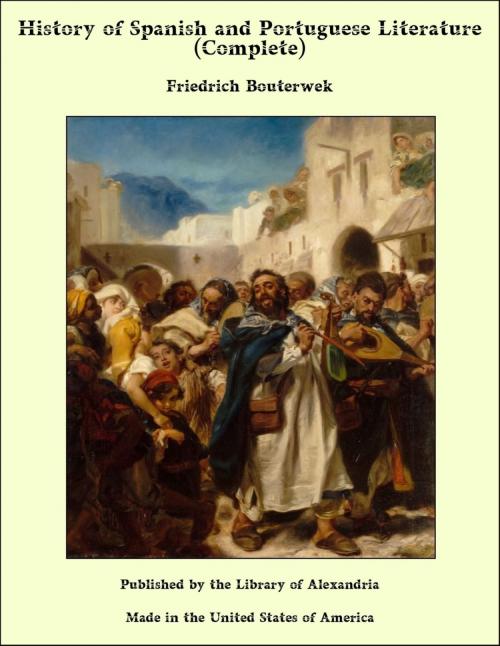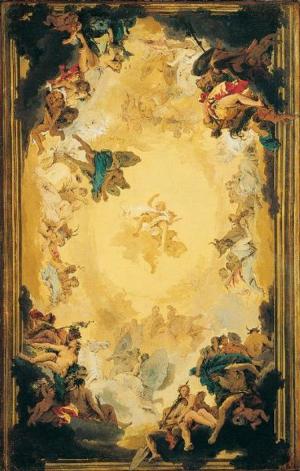History of Spanish and Portuguese Literature (Complete)
Nonfiction, Religion & Spirituality, New Age, History, Fiction & Literature| Author: | Friedrich Bouterwek | ISBN: | 9781465618320 |
| Publisher: | Library of Alexandria | Publication: | March 8, 2015 |
| Imprint: | Language: | English |
| Author: | Friedrich Bouterwek |
| ISBN: | 9781465618320 |
| Publisher: | Library of Alexandria |
| Publication: | March 8, 2015 |
| Imprint: | |
| Language: | English |
When modern refinement began, during the thirteenth century, to emerge from the rudeness of the middle ages, that part of Europe which geographers have called the Pyrenean Peninsula, and which, according to its present political division, forms Spain and Portugal, contained four Christian kingdoms and some Mahometan principalities, to which the title of kingdom has also been given. More than five hundred years had elapsed since the battle of Xerez de la Frontera; and the Moors, who, by the result of that conflict, obtained the dominion of the greater part of Spain and Portugal, had, by the repeated victories of the Christians, been, in their turn, driven back to the southern extremity of the country, and were obviously not destined to maintain themselves much longer even in that quarter. During these five centuries of almost uninterrupted warfare between the race of Moorish Arabs and the Christians of ancient European descent, both parties, notwithstanding that their reciprocal hostility was influenced by fanaticism, had unconsciously approximated in mind and in manners. The intervals of repose, which formed short links in the chain of their sanguinary conflicts, afforded them some opportunities for the interchange of the arts of peace, and they were soon taught to feel for each other that involuntary respect which the brave can never withhold from brave adversaries. Love adventures, in which the Moorish knight and Christian lady, or the Christian knight and Moorish lady, respectively participated, could not be of rare occurrence. The Arab, who, in his native deserts, had not been accustomed to impose on women half the despotic restraints to which the sex is subject in the harems of Mahometan cities, was soon disposed to imitate the gallantry of the descendants of the Goths; and still more readily did the imagination of the Christian knight, in a climate which was far from being ungenial, even to African invaders, acquire an oriental loftiness. Thus arose the spirit of Spanish knighthood, which was, in reality, only a particular form of the general chivalrous spirit then prevailing in most of the countries of Europe, but which, under that form, impressed in an equal degree, on the old European Spaniard an oriental, and on the Spanish Moor a European character.
When modern refinement began, during the thirteenth century, to emerge from the rudeness of the middle ages, that part of Europe which geographers have called the Pyrenean Peninsula, and which, according to its present political division, forms Spain and Portugal, contained four Christian kingdoms and some Mahometan principalities, to which the title of kingdom has also been given. More than five hundred years had elapsed since the battle of Xerez de la Frontera; and the Moors, who, by the result of that conflict, obtained the dominion of the greater part of Spain and Portugal, had, by the repeated victories of the Christians, been, in their turn, driven back to the southern extremity of the country, and were obviously not destined to maintain themselves much longer even in that quarter. During these five centuries of almost uninterrupted warfare between the race of Moorish Arabs and the Christians of ancient European descent, both parties, notwithstanding that their reciprocal hostility was influenced by fanaticism, had unconsciously approximated in mind and in manners. The intervals of repose, which formed short links in the chain of their sanguinary conflicts, afforded them some opportunities for the interchange of the arts of peace, and they were soon taught to feel for each other that involuntary respect which the brave can never withhold from brave adversaries. Love adventures, in which the Moorish knight and Christian lady, or the Christian knight and Moorish lady, respectively participated, could not be of rare occurrence. The Arab, who, in his native deserts, had not been accustomed to impose on women half the despotic restraints to which the sex is subject in the harems of Mahometan cities, was soon disposed to imitate the gallantry of the descendants of the Goths; and still more readily did the imagination of the Christian knight, in a climate which was far from being ungenial, even to African invaders, acquire an oriental loftiness. Thus arose the spirit of Spanish knighthood, which was, in reality, only a particular form of the general chivalrous spirit then prevailing in most of the countries of Europe, but which, under that form, impressed in an equal degree, on the old European Spaniard an oriental, and on the Spanish Moor a European character.















